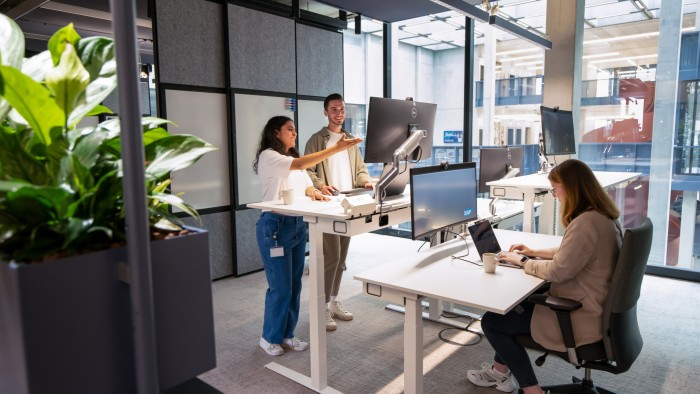Last year IT spending in Europe reached about $1.1tn, up about 9 per cent from 2023, according to estimates by research company Gartner.
Growth has been fuelled by the boom in demand for artificial intelligence technology, and the technical infrastructure, including cloud computing and data centres, to support that and other, more established, business software and services.
In the global market, European tech companies face stiff competition for the best workers. The big US companies typically pay more than European rivals, offering research and development work that is often considered more interesting and respected within the industry, says Chengyi Lin, a professor at Insead business school, in France and an expert on corporate digital strategy.
“The top US tech giants [pay] handsomely” and [the work] is more prestigious,” he says. The concentration of tech R&D roles in the US and high salaries means that many European markets “lose their tech talents, and . . . the cutting edge of development”, Lin adds.
Europe’s tech companies still, however, have much to offer their workers. Attractions include a good work-life balance, generous social security programmes and the chance for employees to shape global products and services for the technological and cultural preferences of local markets, experts say.
These and other labour trends were evident in the inaugural list of Europe’s best employers, based on research by the Financial Times and data provider Statista.
Paternal culture
In the ranking of the best employers, the top company is OneAdvanced, a UK-based software group. The Birmingham-headquartered group supplies finance and procurement, risk management and human resources software to organisations ranging from hospitals to law firms.
Oliver Black, its principal brand strategist, joined the company about 11 years ago. Since then, he has held about half a dozen marketing roles in different divisions of the company, including legal and sports and entertainment.
Black appreciates the company’s extensive employee training — organised through an internal skills platform — and its supportive working culture. “There’s generally not a person I don’t enjoy working with, and everyone kind of does support each other,” he says.
Employee benefits include recently increased paternity leave. “I’m expecting my second child in a couple of months’ time, and our paternity policy has . . . gone from two weeks . . . to four weeks,” says Black. “You know you’re cared about. They are benefits that really add value to your life.”
Employee salaries are reviewed roughly every quarter — in contrast to the corporate convention of annual reviews — Black adds.
Human capital
In March, Germany’s SAP overtook Danish drugmaker Novo Nordisk to become Europe’s most valuable company.
The German group, whose business software is designed to squeeze efficiencies from companies’ finance departments and supply chains, prides itself on an extensive workforce training and wellbeing programme.
Employees at SAP are encouraged to spend about 15 per cent of their working time on “personal development”, such as training or trying different roles for up to six months, says Caroline Hanke, SAP’s global head of organisational growth and health.
For example, a member of SAP’s data research team is on a rotation with an SAP AI team to “gather some more insights on AI engineering”, says Hanke. “She’s doing more data research supporting there, but she gets to see a whole different business. So, she’s using her core skills [data research], but she’s applying them in a different business context, which will, of course, really enhance her skills.”
Employees at SAP — 11th in this year’s ranking of top tech employers in Europe — also receive a wide range of benefits and perks. Some are standard for a large company, such as a subsidised stock purchase scheme, gym and sports facilities. Others, such as mindfulness training and recently cancer screening, less so.
“I used [SAP’s] interest-free loan [for a deposit ] . . . to buy my first home,” says Hanke, who has worked for the company for about 20 years.
SAP tracks the wellbeing of its workforce through an annual survey. This asks employees whether, for example, they feel stressed, empowered or a sense of purpose at work. The answers are then fed into a “business health culture index”.
Increases in employee wellbeing can help the company’s financial performance, SAP says. It has estimated that a 1 percentage point increase in its employee wellbeing index can add between €85mn and €95mn to the company’s global operating profit.
“Our biggest asset at SAP is our workforce,” Hanke says. “And I think we’ve realised that very early on and have taken that basically as a key pillar into our corporate strategy, into our [human resources] strategy.”
International mix
At some of Europe’s top tech employers, the international mix of the workforce can aid the recruitment and retention of employees.
Neil Rogan is global head of corporate communication and digital marketing at Amadeus, a technology supplier to the travel and tourism industry. The company — which supplies more than 400 airlines, travel-agent booking systems, plus kiosks and biometric technology for border authorities — ranked 50th on Europe’s top tech employer list.

Rogan, who was born and educated in Ireland, and who works at the company’s head office in Madrid, likes the “quality of life” in Spain’s capital. He says he enjoys working in an office with “60 nationalities”.
Rogan also values Amadeus’s training and career development (which has included supporting him to study for a masters in digital marketing) and its commitment to employees’ personal development.
Personal development support has included 10 sessions with a psychologist — part of a “healthy leaders” company scheme — to talk about whatever Rogan wanted. “The psychologist was the single best thing I’ve done,” he says. “It has given me so much insight into myself and helped me so much [in and out of work].”
